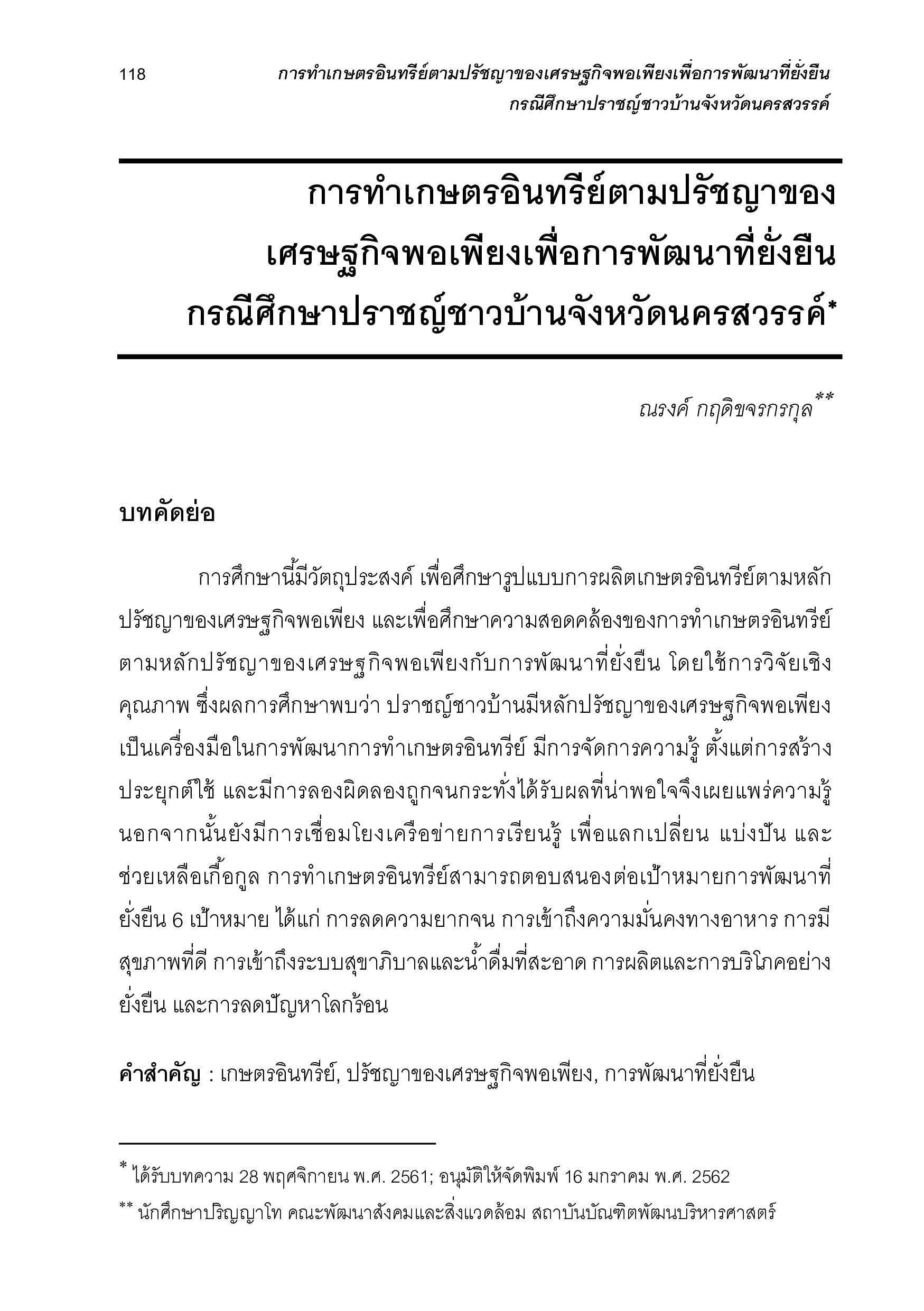Planting Organic Agriculture According to The Philosophy of Sufficiency Economy for Sustainable Development: A Case study of Folk Gurus in Nakhonsawan Province
Keywords:
Organic Agriculture, Sufficiency Economy Philosophy, Sustainable DevelopmentAbstract
The purposes of this study are to study the model of organic agriculture in accordance with the philosophy of sufficiency economy, and to study the consistence of the organic agriculture according to the philosophy of sufficiency economy with sustainable development. A qualitative research method was utilized. The study results found that folk gurus use the sufficiency economy philosophy as a tool for developing organic farming. They manage knowledge through creation, application and trial. Until the results of their knowledge findings were satisfactory, they disseminate them to others. They organized a network of exchange, sharing and join hand to solving problem together. The Organic Agriculture is consistent with six items of a sustainable development goals, namely: no poverty, zero hunger, good health, access to clean water and sanitation, responsible consumption and production, and climate action.
References
เอกสารภาษาไทย
กระทรวงการต่างประเทศ. (2561). สรุปผลการทบทวนการดำเนินการตามวาระการพัฒนาที่ยั่งยืน ค.ศ. 2030 ระดับชาติโดยสมัครใจของประเทศไทยปี 2560. วันที่ค้นข้อมูล 15 มิถุนายน 2561, เข้าถึงได้จาก http://www.manpattanalibrary.com/admin/pdf/1017/pdffile.pdf.
กระทรวงทรัพยากรธรรมชาติและสิ่งแวดล้อม. (2556). ความรู้เบื้องต้นเกี่ยวกับการพัฒนาที่ยั่งยืน. กรุงเทพฯ: อมรินทร์พริ้นติ้ง.
จิรายุ อิศรางกูร ณ อยุธยา และปรียานุช พิบูลสราวุธ. (2556). ตามรอยพ่อ ชีวิตพอเพียงสู่การพัฒนาที่ยั่งยืน. กรุงเทพฯ: อมรินทร์พริ้นติ้ง.
ทิศนา แขมมณี. (2558). ถอดรหัสปรัชญาเศรษฐกิจพอเพียงสู่การสอนกระบวนการคิด. กรุงเทพฯ: จุฬาลงกรณ์มหาวิทยาลัย.
ปรียานุช ธรรมปิยา. (2558). วิกฤติเศรษฐกิจ 2540 กับปรัชญาของเศรษฐกิจพอเพียง. กรุงเทพฯ: อมรินทร์พริ้นติ้ง.
สรพงค์ เบญจศรี. (2553). “เกษตรอินทรีย์ในประเทศไทย.” วารสารมหาวิทยาลัยทักษิณ, 13 (1): 78-88.
สำนักงานคณะกรรมการพัฒนาการเศรษฐกิจและสังคมแห่งชาติ. (2550). ปรัชญาของเศรษฐกิจพอเพียง. กรุงเทพฯ: สำนักงานคณะกรรมการพัฒนาการเศรษฐกิจและสังคมแห่งชาติ.
_______. (2560). แผนพัฒนาเศรษฐกิจและสังคมแห่งชาติ ฉบับที่สิบสอง พ.ศ.2560-2564. วันที่ค้นข้อมูล 15 มิถุนายน 2561, เข้าถึงได้จาก http://www.nesdb.go.th/ewt_dl_link.php?nid=6422.
สุริชัย หวันแก้ว และคณะ. (2545). การพัฒนาที่ยั่งยืนในกระแสโลกาภิวัฒน์กับทิศทางประเทศไทย. กรุงเทพฯ: ศูนย์ศึกษาการพัฒนาสังคม คณะรัฐศาสตร์ จุฬาลงกรณ์มหาวิทยาลัย.
สุริยะ ชนะชัย. (2553). การพัฒนารูปแบบการทำเกษตรอินทรีย์ครัวเรือนชนบทลุ่มแม่น้ำโขงบนฐานเศรษฐกิจพอเพียงและการเกษตรยั่งยืน. วิทยานิพนธ์ปรัชญาดุษฎีบัณฑิต, สาขายุทธศาสตร์การพัฒนาภูมิภาค, บัณฑิตวิทยาลัย, มหาวิทยาลัยราชภัฏสุรินทร์.
เอกสารภาษาต่างประเทศ
Azadi, H. & et al. (2011). “Organic Agriculture and Sustainable Food Production System: Main Potentials.” Agriculture, Ecosystems & Environment, 144 (1): 92-94
Bergsteiner, H. & Dharmapiya, P. (2016). “The Sufficiency Economy Philosophy Process.” In Avery, G. C. & Bergsteiner, H. (eds.). Sufficiency Thinking: Thailand’s gift to an unsustainable world. (pp. 32-52). Sydney: Allen & Unwin.
Collette, L. & et al. (2015). Coping with climate change-the roles of genetic resources for food and agriculture. Rome: Food and Agriculture Organization of The United Nations.
Mongsawad, P. (2010). “The Philosophy of The Sufficiency Economy: A Contribution to the Theory of Development.” Asia-Pacific Development Journal, 17 (1): 130-131.
Wibulswasdi, C. & Dharmapiya, P. & Pootrakool, K. (2016). Sufficiency Economy Philosophy and Development. Bangkok: Foundation of Virtuous Youth.






